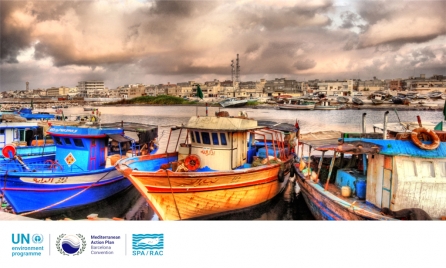Search
04/21: The Gulf of Sirte: a marine biodiversity hotspot to protect
An environmental and socioeconomic assessment of the Gulf of Sirte, elaborated by UNEP/MAP-SPA/RAC in collaboration with the Libyan experts within the EU funded IMAP-MPA project, highlights the need to further protect selected sites within the Gulf and secure fisheries sustainability.
A technical workshop for the presentation of the ecological and socioeconomic assessments of the marine and coastal area of the Gulf of Sirte in Libya has been organized online on 1st April 2021 by SPA/RAC in collaboration with the Ministry of Environment of Libya.

The Gulf of Sirte is one of the beneficiary sites of the IMAP-MPA project that is being coordinated by UNEP/MAP Secretariat and implemented by SPA/RAC in order to develop the integrated monitoring of the sea and coasts and to improve Marine Protected Areas (MPAs) management in Southern and Eastern Mediterranean countries.
Despite the COVID-19 pandemic, an environmental and socioeconomic assessments of the Gulf of Sirte have been carried out to draw up recommendations on biodiversity conservation. This process ultimately aims to identify the most suitable sites to be declared as MPAs, and to prepare the ground for their effective management.
The ecological study revealed that the Gulf of Sirt provides suitable habitats for several species, including endangered species of sea turtles in particular the Loggerhead turtle Caretta caretta, marine mammals, seabirds and seagrasses. It represents also an important spawning area for elasmobranchs. The study highlighted the need to secure fisheries sustainability, which currently have a heavy impact on the fish stocks and certain species of sharks.
The socioeconomic survey conducted in the Gulf showed that about 66% of the fishers interviewed were very positive towards the creation of marine protected areas in the region. They say, reported the experts, that the Gulf includes zones such as Shash area, Lewaija and Ras Al-Ghara, which "are rich in abundance and excellent diversity, but need to be protected from unsustainable practices such as illegal fishing".
The experts recommended improving coordination and communication at national and local levels with the relevant stakeholders, including civil society organisations, to act more efficiently towards the protection of the Gulf of Sirte while sustaining the fisheries. They stressed that the COVID-19 pandemic has severely affected fishers, who need support more than ever to overcome the economic crisis.
The ecological and socioeconomic assessments will soon be available on the SPA/RAC website.
Learn more about the conclusions of the meeting (In Arabic)




Find Us On...